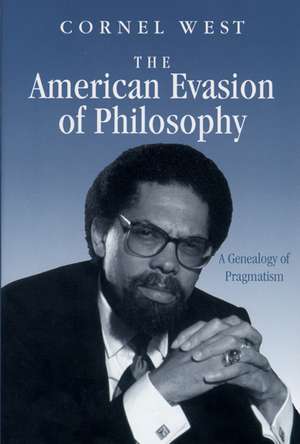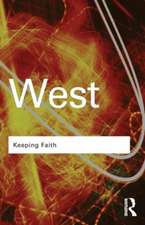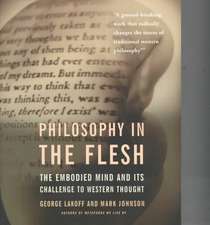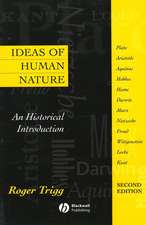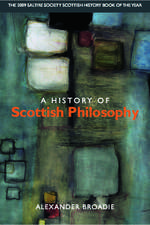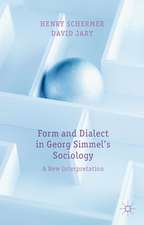The American Evasion of Philosophy: A Genealogy of Pragmatism: Wisconsin Project on American Writers
Autor Cornel Westen Limba Engleză Paperback – 15 apr 1989
Taking Emerson as his starting point, Cornel West’s basic task in this ambitious enterprise is to chart the emergence, development, decline, and recent resurgence of American pragmatism. John Dewey is the central figure in West’s pantheon of pragmatists, but he treats as well such varied mid-century representatives of the tradition as Sidney Hook, C. Wright Mills, W. E. B. Du Bois, Reinhold Niebuhr, and Lionel Trilling. West’s "genealogy" is, ultimately, a very personal work, for it is imbued throughout with the author’s conviction that a thorough reexamination of American pragmatism may help inspire and instruct contemporary efforts to remake and reform American society and culture.
"West . . . may well be the pre-eminent African American intellectual of our generation."—The Nation
"The American Evasion of Philosophy is a highly intelligent and provocative book. Cornel West gives us illuminating readings of the political thought of Emerson and James; provides a penetrating critical assessment of Dewey, his central figure; and offers a brilliant interpretation—appreciative yet far from uncritical—of the contemporary philosopher and neo-pragmatist Richard Rorty. . . . What shines through, throughout the work, is West's firm commitment to a radical vision of a philosophic discourse as inextricably linked to cultural criticism and political engagement."—Paul S. Boyer, professor emeritus of history, University of Wisconsin–Madison.
Wisconsin Project on American Writers
Frank Lentricchia, General Editor
"West . . . may well be the pre-eminent African American intellectual of our generation."—The Nation
"The American Evasion of Philosophy is a highly intelligent and provocative book. Cornel West gives us illuminating readings of the political thought of Emerson and James; provides a penetrating critical assessment of Dewey, his central figure; and offers a brilliant interpretation—appreciative yet far from uncritical—of the contemporary philosopher and neo-pragmatist Richard Rorty. . . . What shines through, throughout the work, is West's firm commitment to a radical vision of a philosophic discourse as inextricably linked to cultural criticism and political engagement."—Paul S. Boyer, professor emeritus of history, University of Wisconsin–Madison.
Wisconsin Project on American Writers
Frank Lentricchia, General Editor
| Toate formatele și edițiile | Preț | Express |
|---|---|---|
| Paperback (2) | 146.88 lei 6-8 săpt. | |
| University of Wisconsin Press – 15 apr 1989 | 146.88 lei 6-8 săpt. | |
| Palgrave Macmillan UK – dec 1989 | 387.96 lei 6-8 săpt. |
Preț: 146.88 lei
Nou
Puncte Express: 220
Preț estimativ în valută:
28.11€ • 29.42$ • 23.39£
28.11€ • 29.42$ • 23.39£
Carte tipărită la comandă
Livrare economică 31 martie-14 aprilie
Preluare comenzi: 021 569.72.76
Specificații
ISBN-13: 9780299119645
ISBN-10: 0299119645
Pagini: 292
Dimensiuni: 152 x 229 x 20 mm
Greutate: 0.41 kg
Ediția:1
Editura: University of Wisconsin Press
Colecția University of Wisconsin Press
Seria Wisconsin Project on American Writers
ISBN-10: 0299119645
Pagini: 292
Dimensiuni: 152 x 229 x 20 mm
Greutate: 0.41 kg
Ediția:1
Editura: University of Wisconsin Press
Colecția University of Wisconsin Press
Seria Wisconsin Project on American Writers
Recenzii
Winner of the 1992 Critic’s Choice Award
Notă biografică
Cornel West is the Class of 1943 University Professor of Religion at Princeton University, and author of the influential Race Matters. His recent work includes two books he coauthored on public policy issues: The Future of American Progressivism and The War Against Parents.
Descriere
Taking Emerson as his starting point, Cornel West’s basic task in this ambitious enterprise is to chart the emergence, development, decline, and recent resurgence of American pragmatism. John Dewey is the central figure in West’s pantheon of pragmatists, but he treats as well such varied mid-century representatives of the tradition as Sidney Hook, C. Wright Mills, W. E. B. Du Bois, Reinhold Niebuhr, and Lionel Trilling. West’s "genealogy" is, ultimately, a very personal work, for it is imbued throughout with the author’s conviction that a thorough reexamination of American pragmatism may help inspire and instruct contemporary efforts to remake and reform American society and culture.
"West . . . may well be the pre-eminent African American intellectual of our generation."—The Nation
"The American Evasion of Philosophy is a highly intelligent and provocative book. Cornel West gives us illuminating readings of the political thought of Emerson and James; provides a penetrating critical assessment of Dewey, his central figure; and offers a brilliant interpretation—appreciative yet far from uncritical—of the contemporary philosopher and neo-pragmatist Richard Rorty. . . . What shines through, throughout the work, is West's firm commitment to a radical vision of a philosophic discourse as inextricably linked to cultural criticism and political engagement."—Paul S. Boyer, professor emeritus of history, University of Wisconsin–Madison.
Wisconsin Project on American Writers
Frank Lentricchia, General Editor
"West . . . may well be the pre-eminent African American intellectual of our generation."—The Nation
"The American Evasion of Philosophy is a highly intelligent and provocative book. Cornel West gives us illuminating readings of the political thought of Emerson and James; provides a penetrating critical assessment of Dewey, his central figure; and offers a brilliant interpretation—appreciative yet far from uncritical—of the contemporary philosopher and neo-pragmatist Richard Rorty. . . . What shines through, throughout the work, is West's firm commitment to a radical vision of a philosophic discourse as inextricably linked to cultural criticism and political engagement."—Paul S. Boyer, professor emeritus of history, University of Wisconsin–Madison.
Wisconsin Project on American Writers
Frank Lentricchia, General Editor
Cuprins
Part 1 The Emersonian prehistory of American pragmatism: Emerson on power (and tradition); Emerson on provocation (and the market); Emerson on personality (and race); Emerson as organic intellectual. Part 2 The historic emergence of American pragmatism: Peirce on scientific method, community and Christian love; James on individuality, reconciliation and heroic energies. Part 3 The coming-of-age of American pragmatism - John Dewey: Dewey on historical consciousness, critical intelligence nad creative democracy. Part 4 The dilemna of the mid-century pragmatic intellectual: the Deweyan political intellectual, Sidney Hook; the Neo-Deweyan radical social critic, C.Wright Mills; the Jamesian organic intellectual, W.E.B. Du Bois; the Jamesian cultural critic, Reinhold Niebuhr; the pragmatist as Arnoldian literary critic, Lionel Trilling. Part 5 The decline and resurgence of American pragmatism - W.V. Quine and Richard Rorty. Part 6 Prophetic pragmatism - cultural criticism and political engagement: Roberto Unger and third-wave left romanticism; the challenge of Michel Foucault; tragedy, tradition and political praxis; prophetic pragmatism and postmodernity.
